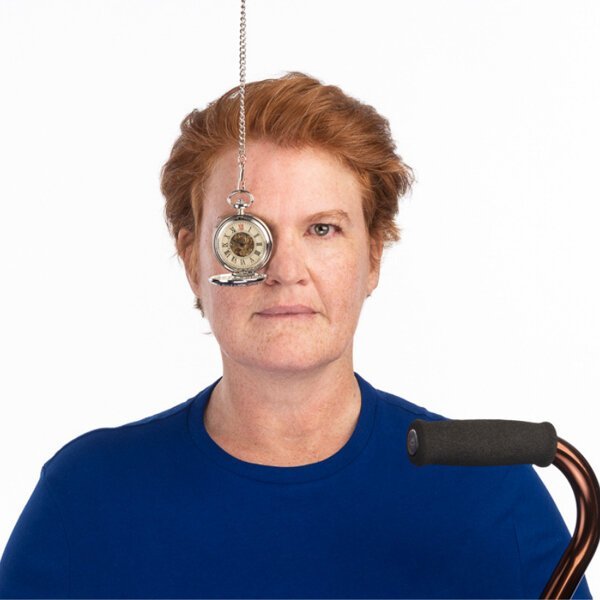Review: Clock for No Time
WRITTEN BY COURTNEY LAWRENCE.
4 out of 5 stars
In a culture that praises the hiding or numbing of suffering, Clock For No Time is refreshingly original. With well-placed moments of humour, it is poignant without denigrating the conditions it portrays, or succumbing to the pan-representation of minorities for which the silver screen is increasingly becoming known. It is also brilliantly accessible with the inclusion of subtitles, voiced by its director, as well as sign language.
Clock For No Time asks viewers to reconsider the empty mantras such as ‘a day without laughter is a day wasted’ of an impatient society from the moment Simone (Jo Stone) painstakingly limps across the length of the Grotowski-esque set. As she details the tribulations of an aching, uncooperative body, rain begins to pour in stripes of immersive light. She repeats to herself, ‘dance in the rain’. This is not by any means a new mantra. However, dancing in the rain is a motif usually reserved for those characters overwhelmed with the enjoyable feelings of love, gratitude or excitement. Their inhibition under constructed rain stems from a powerful source: joy. But what happens when constant pouring of rain is the constant unravelling of your father’s mind and memories? Of your own unhealed frame? Of a family member that greets you with an introduction rather than a familiar hug?
It requires bravery to endure pain that does not go away with seasons, to smile through chronic conditions that are not merely the first part of an uplifting before and after story. Instead, director Michele Saint-Yves has told a story that is honest. One that preserves dignity while inviting empathy. One that highlights our need for compassion and patience more than ever, despite our tendency to put our best foot forwards on social media. Yet perhaps in its ambition to do so the play is disposed to leave its audience adrift while journeying through vignettes of Latin poetry, human biology and astronomy that are not immediately connectable to audiences.
Nonetheless, the small cast of characters are redemptive, and in true Grotowski style the somatic presence and pathos of the actors are given the room they need and are wonderfully executed. With delicacy their portrayals evoke a sense of awe for our human condition that can be cruel and yet so beautifully inexplorable - perhaps at the same time - for the intertwining of language and rhythym that brings the fading memory of Eric (Paul Reichstein) years back in time to the soothing memory of his mother reading to him in bed. Despite the sometimes incongruous sequence of events, the play brings together both a rawness of tragedy and the warmth of sharing in remembrance, of standing by a loved one’s side through all that our fast-paced society can conjure.
EDITORIAL NOTE: This article has been reuploaded and was originally published in 2021.
